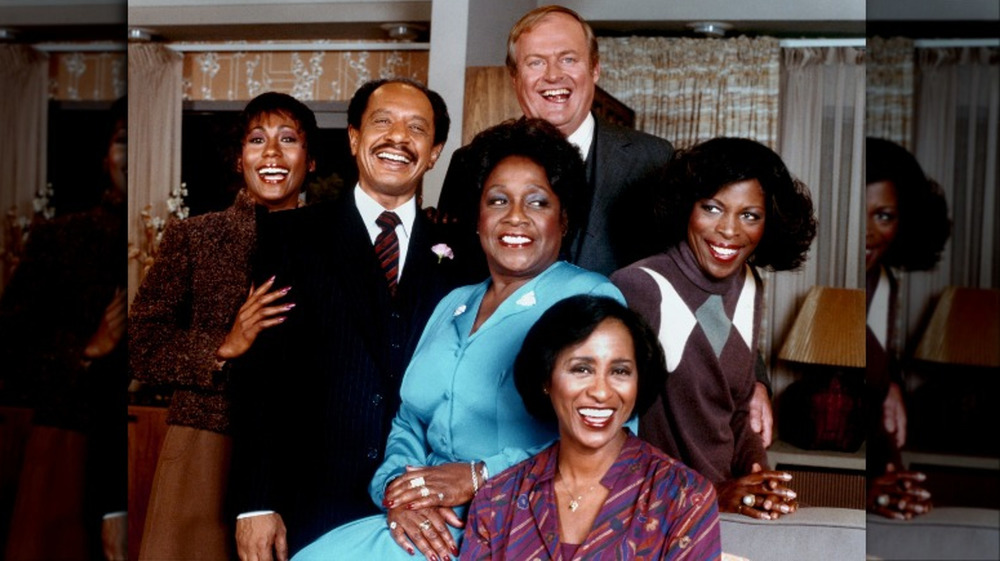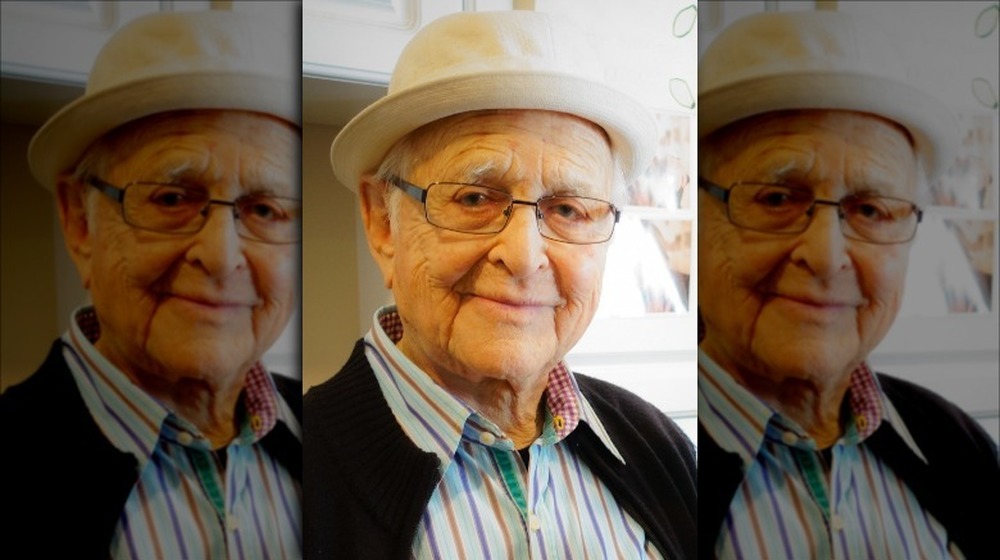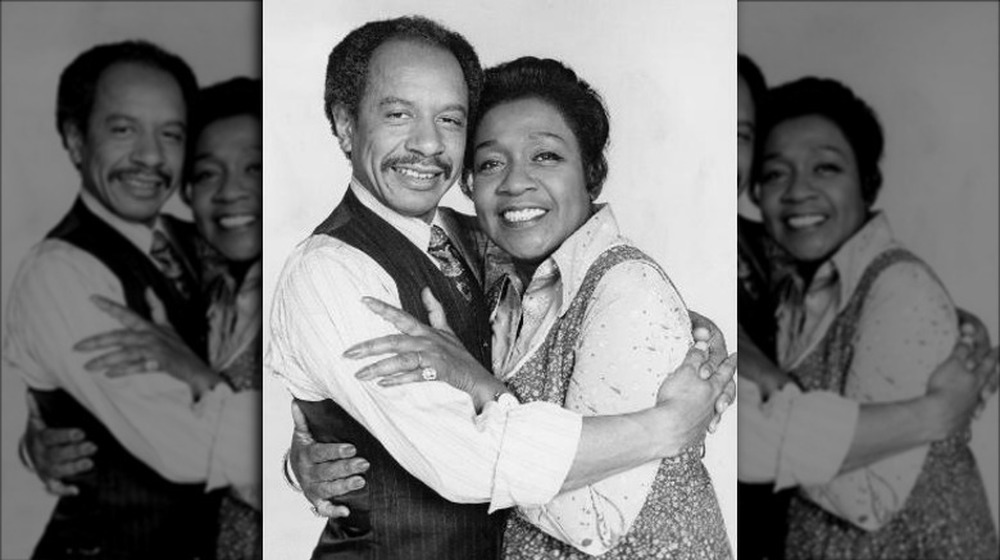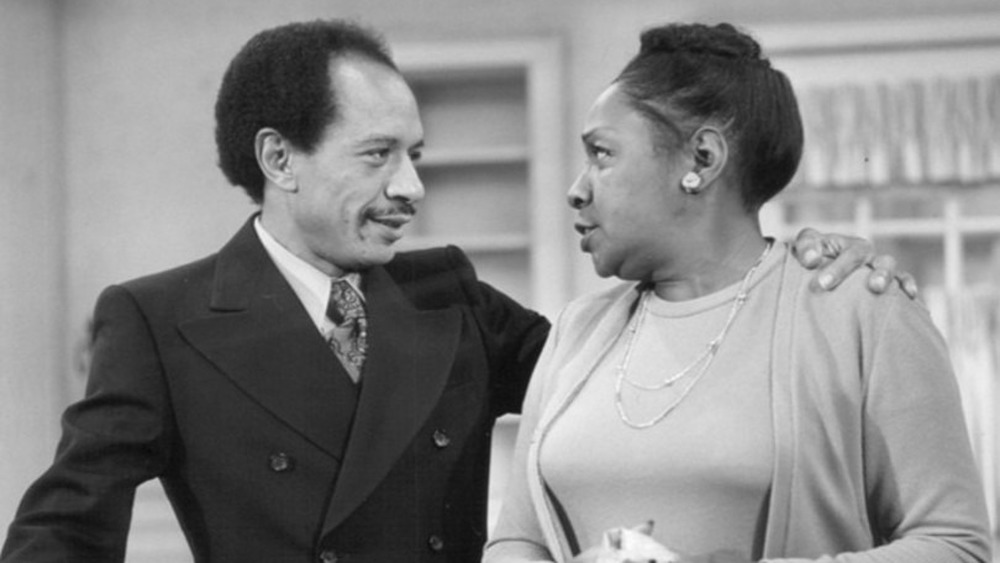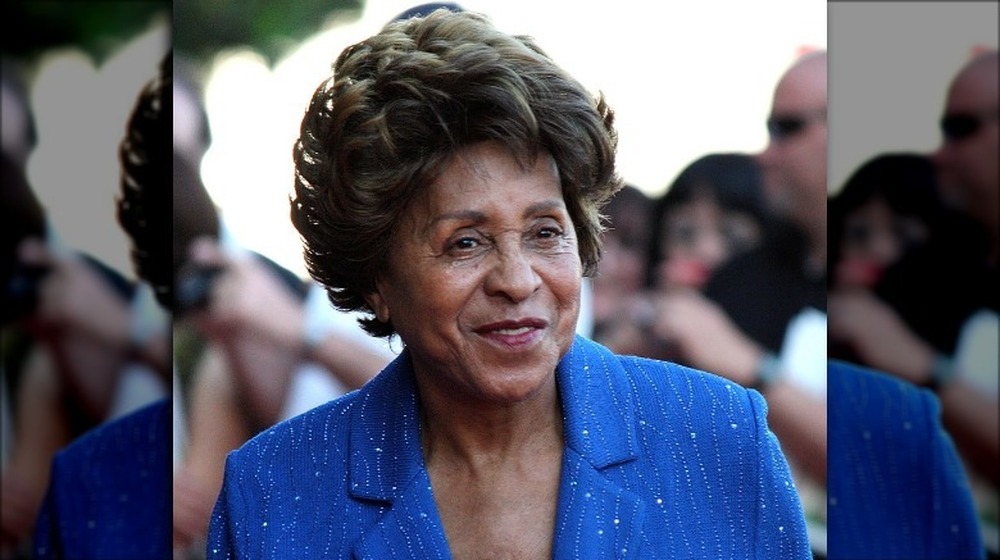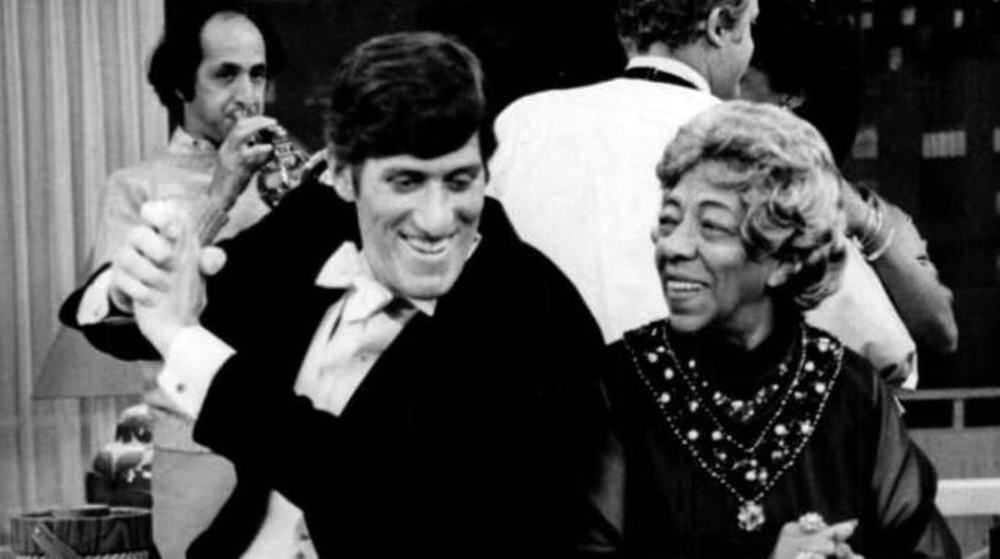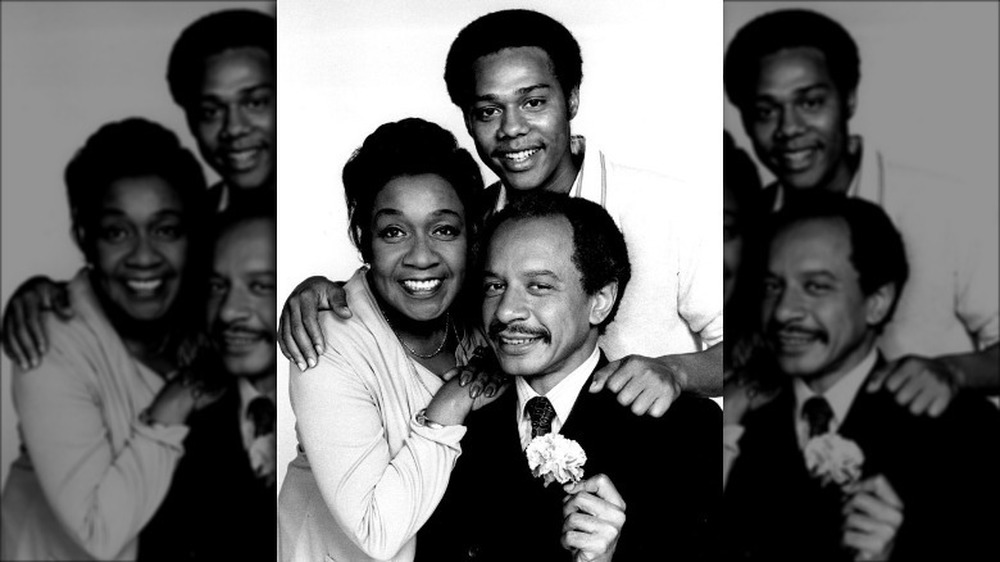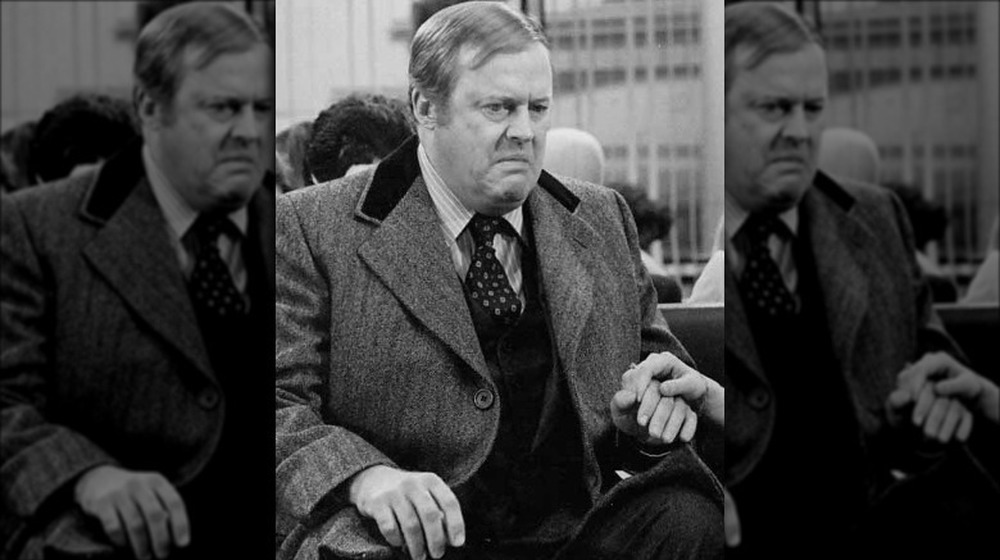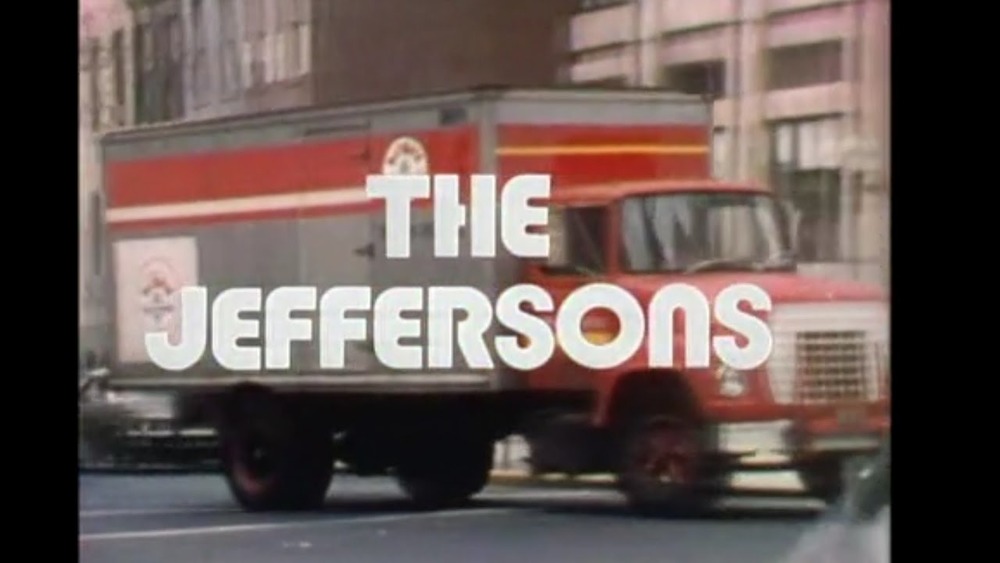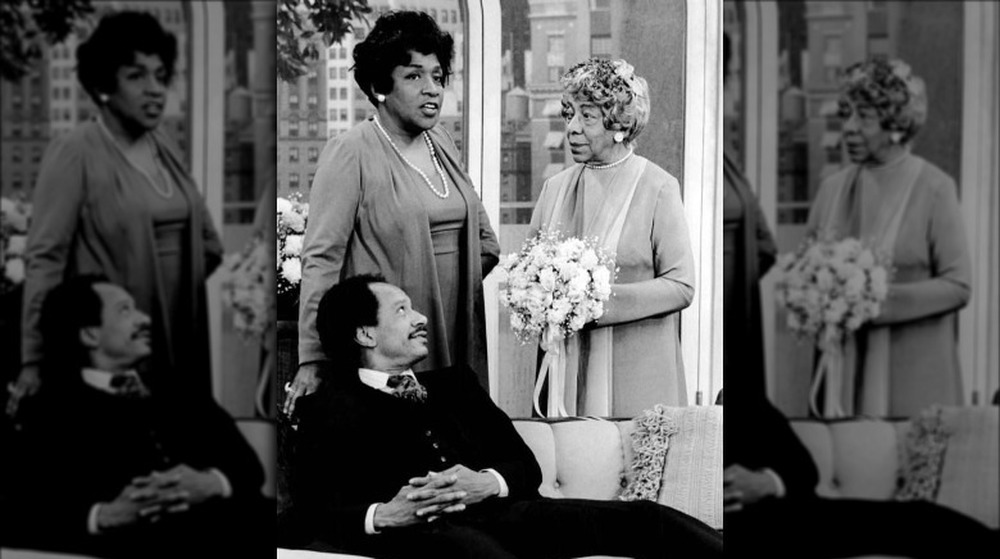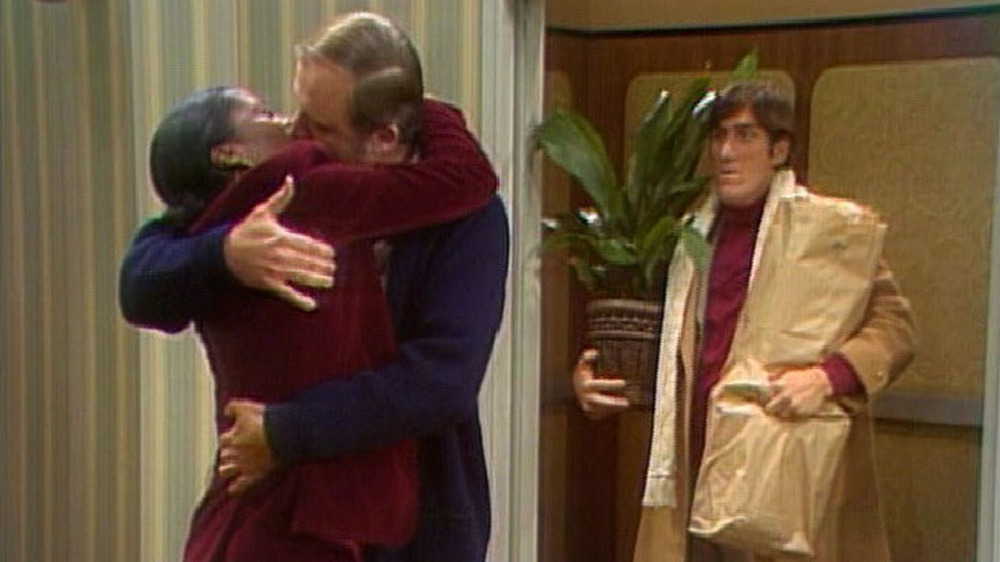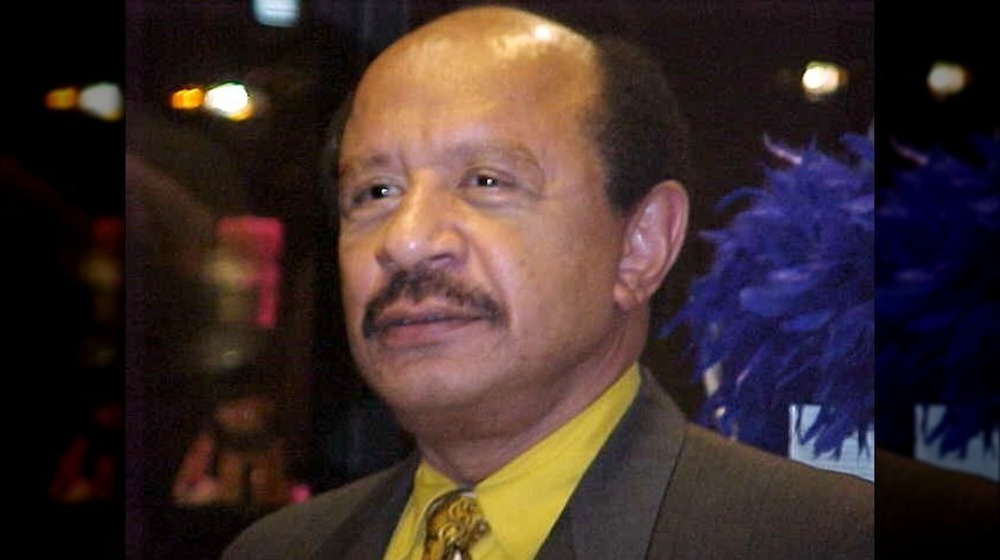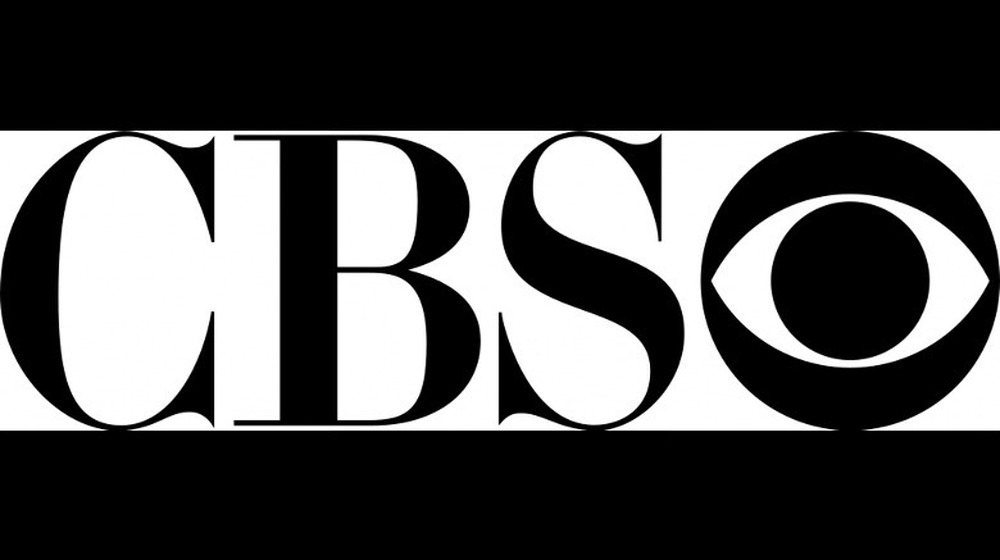The Untold Truth Of The Jeffersons
Most television is ephemeral. TV shows can be huge, massive hits for years—and then vanish into near-obscurity (seriously, when was the last time you had a conversation about Lost?). Even when shows remain in the popular culture after their cancellation, they're usually relegated to a murky backwater on the cable or streaming menu.
And then there's The Jeffersons. You might think this classic situation comedy is a relic of the 1970s, and in some ways you'd be right. But the moment you read the title you heard its iconic theme song in your head, and no matter your age or background you've probably seen an episode or a dozen—and maybe not that long ago. Norman Lear's 1975 spinoff of All in the Family remains a unique show. It was surprisingly thoughtful on issues of race and class within the confines of a broad comedy in prime time national television. Groundbreaking and performed by some of the most talented actors and actresses of its time, The Jeffersons has remained a cultural touchstone for some very good reasons. Here's the untold truth of The Jeffersons.
The Jeffersons was inspired by The Black Panthers
The Black experience wasn't portrayed much—or at all—on television prior to the 1970s. When shows featured Black characters, they were often portrayed as stereotypes, as clownish fools or ominous criminals. So when shows like Norman Lear's Good Times hit the airwaves in the early 1970s, it was seen as huge progress. At least stories featuring Black people were being told, and Black actors were getting significant roles on TV.
But as Variety reports, this didn't satisfy everybody. Members of the Black Panther Party set up a meeting with Lear to discuss Good Times. They complained that shows featuring Black casts always portrayed Black people as poor, reinforcing some stereotypes even as they undermined others. The patriarch of the Evans family, they noted, had to work several jobs to support his large family, and they noted that Black characters in general were often depicted in cheap clothing and in other negative ways. As the Atlanta Black Star notes, the Panthers told Lear that there were successful Black people in the world whose stories could be compelling and funny.
The conversation resonated with Lear, and he began to conceive of The Jeffersons as an effort to show a Black family having real economic success and living the American Dream.
George Jefferson's back story was complex
Situation comedies—aka "sitcoms"—aren't always noted for their complex writing and deeply-imagined characters. And The Jeffersons was in many ways a broad, superficial comedy that relied on racially-charged jokes and physical comedy to get laughs. Which is why it's easy to forget that George Jefferson actually had a fascinating fictional background story that was more thoughtful than your typical sitcom fare.
As noted by The Wall Street Journal, that backstory went back to the Jefferson family's roots in Alabama as sharecroppers, a detail that spoke volumes about George Jefferson's obsession with wealth, status, and the visual signs of both. As The NWI Times notes, George worked as a janitor for a large apartment building while his wife, Louise "Weezy" Jefferson, worked as a housekeeper. As discussed by critic Robert E. Crafton, an insurance settlement allowed George to quit his job and launch his first dry-cleaning business, which in turn allowed the Jeffersons to move from Harlem to Queens (becoming Archie Bunker's neighbors in the process), and finally to make the move to Manhattan.
Although this backstory wasn't explicitly referenced, it showed up in the writing. Weezy is initially reluctant to hire a housekeeper in the first episode in part because she's had that experience herself. And in one episode when George is told a white worker should be referred to as a "custodian" he remarks that if he was black, he'd be called a "janitor."
Norman Lear wrote George Jefferson for Sherman Hemsley
Television historians know that while the character of George Jefferson was introduced on All in the Family in 1971, he didn't actually show up on screen until 1973. As noted by The New York Times, the ostensible reason given was that he was uncomfortable walking into a white man's house, setting up the character as a foil for Archie Bunker's racism.
But the real reason was more pragmatic: Norman Lear had created the character for Sherman Hemsley, but Hemsley was under contract for the play Purlie and refused to break his contract. According to Encyclopedia.com, Hemsley had built a reputation as a powerhouse performer, and Lear had caught his performance in Purlie in New York in 1970 and knew he wanted him for the character of George. Rather than cast someone else, Lear decided to keep George offscreen until Hemsley was available.
Until then, Lear created the character of Henry Jefferson, George's brother. Portrayed by Mel Stewart, Henry got the lines and screen time that would have gone to George. At least, he did until Hemsley became available—Stewart's last appearance as Henry was Hemsley's first appearance as George. Henry Jefferson was never seen again.
Marla Gibbs kept her day job—for two years
Marla Gibbs remains best-known to many people as the sarcastic housekeeper, Florence, on The Jeffersons. It was her breakout role; as noted by The History Makers, Gibbs had started taking acting classes when her job with United Airlines transferred her from Detroit to Los Angeles, but prior to being cast as Florence the actress had only appeared in a handful of theater roles and one film, 1973's Sweet Jesus, Preacher Man.
Florence was only supposed to be a bit part, but audiences loved her, and the character of Florence was promoted to full-time status. But Gibbs knew how quickly fortunes turned in Hollywood. According to The Washington Post, she'd been working for United Airlines for 11 years when she got the job on The Jeffersons—and she kept working there for two more years, not wanting to give up a good job for an acting role that might disappear at any moment.
Gibbs says that she worked out an adjusted schedule with United that allowed her enough time to film her scenes and then race into work, where she worked the phones in their reservations office. Often, people calling in to book flights would tell her that her voice sounded familiar, and she'd just laugh it off. One other reason she kept her job despite becoming famous on a top-rate television show? She got unlimited passes from the airline.
The Jeffersons was a step forward
Before the 1970s, there hadn't been any TV shows with majority Black casts in decades, and the Black characters that did appear on television were usually not particularly grounded in reality. As Smithsonian Magazine notes, when Diahann Carroll debuted in 1968's Julia, portraying a Black woman working as a nurse and raising her son as a widow, it was controversial because it avoided any reference to the racial politics of the time and presented what many felt was a "white" character simply played by a Black actress.
As noted by the Atlanta Journal-Constitution, this began to change in the 1970s, especially with the work of Norman Lear. Shows like Sanford and Son and Good Times had all-Black main casts and made an attempt to depict Black American life more realistically. But as BET notes, The Jeffersons was a real departure not only because it was just the second African-American sitcom to hit the top five in ratings, or because Isabel Sanford was just the second Black actress to win an Emmy Award for Best Actress. The Jeffersons was notable because it depicted a Black family as upper-middle class. Affluent and successful, the Jeffersons still had to deal with race, prejudice, and economic pressures, and the show represented a more nuanced and more complex view of the Black American experience.
The character of George Jefferson was made inoffensive
As groundbreaking as The Jeffersons was in terms of depicting Black America on the small screen, it still earns criticism for some of its choices. As progressive as it was when it came to race relations, it hedged its bets in many ways. As noted by The Baltimore Sun, many Black Americans found aspects of the show—from George Jefferson's "pimp walk" strut to his general foolishness—to be offensive.
But as Ebony writes, this was a deliberate calibration by the show's creators to make the show and the character of George Jefferson more palatable to audiences not quite ready to accept Blacks as their equals. The character of George Jefferson was conceived of as a mirror image in some ways of Archie Bunker. Both men are bigoted, and both use sarcasm and insults as weapons. But white audiences could feel good about being more racially sensitive and evolved than Bunker, whereas George Jefferson's upward mobility could be seen as threatening. Making George a little ridiculous softened the blow, because it made it clear that no matter how successful he and his family might be, they would always be second-class.
The show pushed boundaries
In some ways, 1975 doesn't seem so long ago—but it was truly a different time in more ways than one. Today, a transgender person has been nominated to be part of the president's cabinet, and the Vice President of the United States is in an interracial marriage. Back in 1975, issues like these were much more shocking—as noted by The Hollywood Times, interracial marriage had only become legal throughout the country in 1967! And issues like these were also almost never addressed on television—until The Jeffersons came along.
The list of firsts achieved by The Jeffersons is impressive. As BET reports, it was the first TV show to directly address suicide in an episode where Florence the housekeeper falls into a depression and contemplates ending her life. MeTV points out that it was the first situation comedy on prime time television to depict a transgender character—George's old Navy pal Eddie, revealed to now be Edie. And as The New York Daily news reports, it was the first time in American television history that an interracial marriage was depicted in a regular series with the characters of Helen and Tom Willis. It's rare for a television comedy to lead cultural change like this, and it puts The Jeffersons into historical perspective.
The Jeffersons theme song is one of the best of all time
One of the reasons The Jeffersons remains a pop culture powerhouse when many contemporary TV shows have faded from our collective memory is the theme song. Simply put, "Movin' On Up" isn't just a great TV show theme song, it's a great song, full stop. Everybody knows it, and you can't help but sing along.
It's also one of the more thoughtful and meaningful theme songs in TV history. The song was co-written by Ja'Net DuBois, who portrayed Willona on Norman Lear's other show, Good Times, and Jeff Barry. As noted by MeTV, Barry is something of a legend—he co-wrote (with his wife, Ellie Greenwich) a long list of classic songs, including "Da Doo Ron Ron," "Then He Kissed Me," "Be My Baby," "River Deep—Mountain High," and "Leader of the Pack."
DuBois wanted to do more than just act, and when she approached Lear about branching out he suggested she write the theme song for his new show. DuBois infused the song with her own story—CNN reports that DuBois had always dreamed of moving her mother into a "deluxe apartment" when she achieved success. The song also adamantly drew from Black culture, styled almost as a spiritual—complete with 35-member choir—that wouldn't have been out of place in church. It was almost totally unlike any other theme song you would hear on TV at the time, and that was the whole point.
George Jefferson's a bigot—but not a racist
On one level, The Jeffersons is just a silly sitcom, and George Jefferson is a very silly character, prone to foolish schemes (like buying a piano he doesn't know how to play only to discover there's no way to fit it through his front door) and loud, boorish outbursts. But he's actually one of the most complex characters in TV history.
As noted by Ebony, while it's easy to view George Jefferson as a "Black Archie Bunker," that's not accurate. While the character was initially conceived as a Black antagonist for Bunker—clearly a racist—Jefferson was also conceived almost from the very beginning as being beyond Bunker. Archie is a working-class man who will never go beyond his working day and his easy chair in his modest house, whereas George and his family are destined to move on up—and leave the Bunkers behind in a world they'll never escape.
More importantly, as one of the writers on the show, Jay Moriarty, told The Hollywood Times, Archie Bunker's bigotry is "pure prejudice" while George Jefferson's bigotry is a reaction to that prejudice. Bunker has no reason to hate Blacks or to view them as inferior. Jefferson has plenty of reason to distrust white people and the power structures they use to oppress him.
Network executives tried to suppress the interracial aspects of The Jeffersons
In 1975, Norman Lear was possibly the most powerful man working in television. After the huge success of shows like All in the Family, Maude, Good Times, and Sanford and Son—in terms of ratings as well as critical reception—he had the ability to do things other showrunners couldn't. He used that power to push the envelope, depicting the first transgender character in a situation comedy and the first recurring interracial marriage.
But just because Lear could push those characters and storylines onto the screen didn't mean everyone was happy about it. In a contemporary review by The New York Daily News, in fact, a scene in which Tom and Helen Willis engage in a long, tender kiss is explicitly noted for being unusual because they are an interracial couple. As reported by New Ravel, network executives weren't happy about taking things that far, and pressured the producers to remove the scene. Fame10 notes that executives worried depicting an interracial kiss would lead to violence—and, worse, to affiliate stations dropping the show. Luckily, producer (and future network president) Fred Silverman fought to keep the scene in, and protest was muted.
Sherman Hemsley hated using corny racist jargon
As noted by Ebony, many of the actors working on The Jeffersons were serious artists with a lot of training. Sherman Hemsley, for example, came out of the revered Negro Ensemble Company (NEC), as did Roxie Roker (Helen Willis). Other NEC graduates include John Amos, Richard Roundtree, Denzel Washington, and Angela Bassett. Hemsley was so good, show creator Norman Lear waited years to be able to hire him.
Hemsley was very experienced and took his performance very seriously. So when he flubbed lines during episode tapings, it's safe to assume it wasn't due to nerves or incompetence—as reported by Fame10, it was a form of passive resistance. Early seasons of the show used racial epithets for both Black and white characters fairly often, but as time went on Hemsley thought his character should be evolving and stop using expressions like "honky." As New Ravel notes, when his requests for change were ignored he began deliberately flubbing his lines or saying the offensive words too low for the microphones to pick up, forcing the producers to reshoot scenes again and again. Eventually this tactic worked, and the writers stopped using the offensive terms.
CBS mistreated the show
As noted by BET, The Jeffersons was a consistently high-rated show—only the second sitcom with a majority Black cast to land in the Top Five of the Nielsen Ratings, in fact. Over the course of its 11-year run, the series was almost always one of the most-watched on television. Which makes it curious that its network, CBS, treated it as if the show was in trouble. The show's time slot, for example, changed a ridiculous 15 times over those 11 years. Normally successful shows are allowed to develop in a specific time slot in order to become an anchor for the network, but for some reason The Jeffersons was moved around constantly, forcing viewers to seek it out and figure out how to re-arrange their viewing schedules to accommodate it.
As Black America Web reports, when the show was canceled in 1985 the network didn't even bother to inform the cast. The actors found out through the media reports or when friends contacted them to ask about it. This was perceived as an act of deep disrespect by many of the cast members, and it also meant that one of the most successful and longest-running comedies of all time didn't get to have a proper series finale.
Many people can't help but note that the main difference between The Jeffersons and other successful sitcoms that both enjoyed stable a time slot and received a formal finale episode is the color of the cast's skin.
